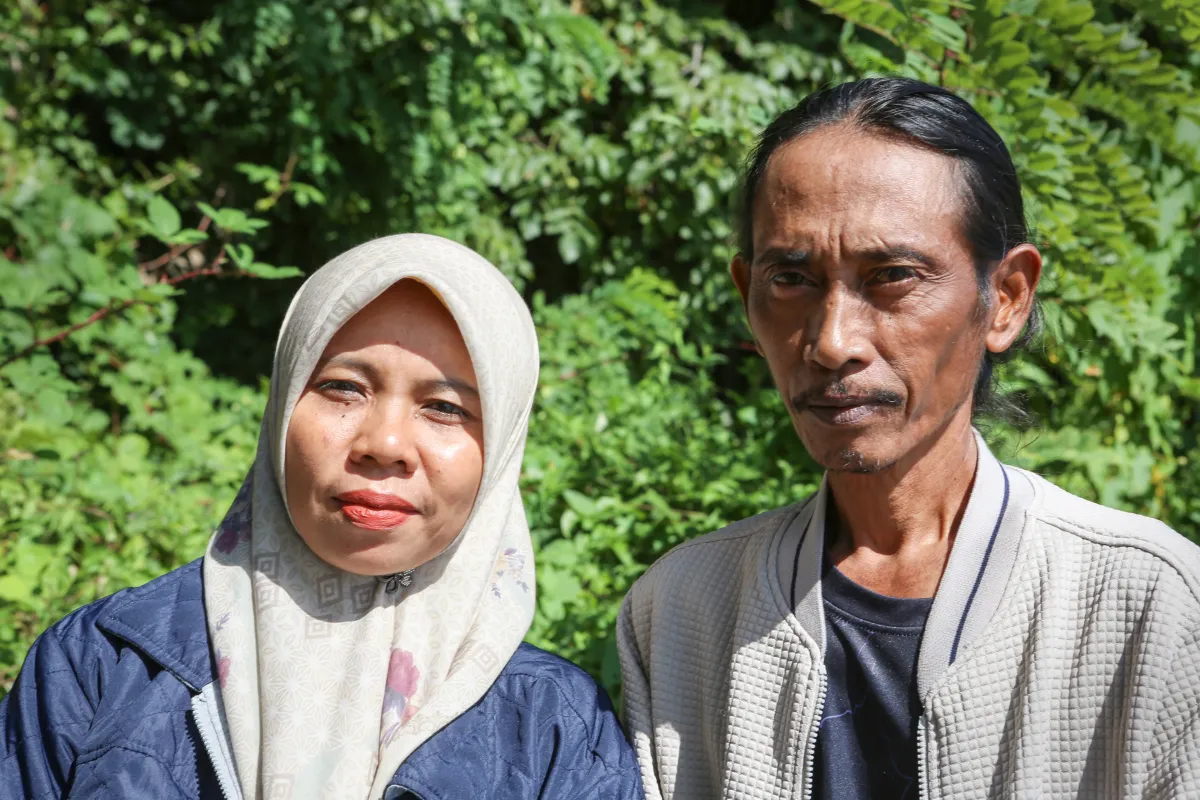
Indonesians Vs Holcim: 'We Want To Save Our Island'
I cover climate change and energy through reportages, articles, interviews and in-depth reports. I am interested in the impacts of global warming on everyday life and solutions for an emission-free planet. Passionate about travel and discovery, I studied biology and other natural sciences. I have been a journalist for SWI swissinfo for more than 20 years.
-
More from this auth
Italian Departme
-
Français
fr
Des Indonésiens contre Holcim: ((Nous voulons sauver notre île))
Read more: Des Indonésiens contre Holcim: ((Nous voulons sauver notre île)
Italiano
it
Indonesiani contro Holcim:“Vogliamo salvare la nostra isola”
Original
Read more: Indonesiani contro Holcim:“Vogliamo salvare la nostra isola
“It's beautiful here, it reminds me of home,” says Arif Pujianto. He stands on the shore of Lake Geneva in Switzerland, watching the sunlight reflect off the water's surface. Nearby, local fishermen empty their nets in a wooden shack.
Pujianto, 54, also lives near the water. He has a house on the beach on Pulau Pari, a small island in Indonesia. His son is a fisherman, and he repairs motorcycles and boat engines. But the sea, on which his family's livelihood depends, is becoming a threat.
The water level keeps rising, and floods periodically submerge roads and homes. Saltwater contaminates freshwater wells. Fishing and tourism, the island's main economic activities, are at risk.“We're losing our island because of climate change,” says Pujianto during a meeting in Tolochenaz, organised by the relief organisation of the Protestant Reformed Church (HEKS) at the end of August.
More More How one Swiss lawyer is fighting for climate action in the courtsThis content was published on Dec 21, 2022 Lawyer Nina Burri wants to take one of Switzerland's biggest companies to court with a risky climate lawsuit.
Read more: How one Swiss lawyer is fighting for climate action in the courtFor Pujianto, one of the culprits has a clear name: Holcim. The Swiss multinational, headquartered in Zug, is one of the world's largest cement producers. According to the Climate Accountability Institute, it is among the 180 companies that have produced the most CO2 emissions globally since the pre-industrial eraExternal link .
Together with other island residents, Pujianto has filed a civil lawsuit against Holcim for its role in the climate crisis. The people of Pulau Pari have not contributed to global warming, yet they suffer its consequences, he laments.“It's unfair.”
Whether Holcim must be held accountable for this injustice will be determined by a Swiss court. On September 3, a preliminary hearing at the Cantonal Court of Zug will decide whether the case is admissible.
This is the first legal action of its kind against a major cement company. It is also the first lawsuit filed by Indonesian citizens against a foreign company for climate-related damages.
The Holcim case could set a precedent for similar lawsuits in Switzerland and around the world.“We are climate victims. We want to fight for our rights,” says Ibu Asmania, one of the plaintiffs who will accompany Pujianto to the historic first hearing.
Pulau Pari in Indonesia. Keystone / Mast Irham Most of Pulau Pari underwater by 2050
Pulau Pari is located about 30 kilometres northeast of Jakarta, Indonesia's capital. Its 1,500 residents live on an area of roughly 0.5km2. The island's highest point is just 1.5 metres above sea level.
Tidal floodings have long been part of life on Pulau Pari. But with the climate crisis, floods are becoming more frequent and reaching further inland.“Once, the water came at night. We had to save our electronics at lightning speed and get ourselves to safety,” Pujianto recalls, referring to the 2021 flood.
External ContentEnvironmental organisations say that by 2050, most of Pulau Pari could be underwater.
Residents want to reinforce the foundations of their homes or rebuild further from the shore. They've planted mangroves to protect the coast from erosion, but protective dikes are also needed.“This is very costly, and we can't afford it,” Pujianto says.
In 2021, the World Bank projected that around 48.4 million people in East Asia and the Pacific, a region that includes Indonesia, could be forced to leave their homes by 2050 due to climate-related disasters.
Pujianto does not want to leave his island. However, he is asking for compensation for part of the damage suffered and support to protect his home.
That is why in January 2023, he filed a civil lawsuit in Switzerland against Holcim together with three other residents of Pulau Pari. They are supported External link by HEKS, the European Center for Constitutional and Human Rights (ECCHR), and WALHI, Indonesia's largest and oldest environmental NGO.
Damages caused by climate changeThe plaintiffs allege a violation of personality rights under the Swiss Civil Code due to Holcim's CO2 emissions. According to a study by the Global Climate ForumExternal link , the damage on Pulau Pari is indeed caused by global warming linked to greenhouse gases emissions.
Cement production accounts for about 8% of global CO2 emissionsExternal link . If it were a country, the cement industry would rank among the most polluting nations.

Legal Disclaimer:
MENAFN provides the
information “as is” without warranty of any kind. We do not accept
any responsibility or liability for the accuracy, content, images,
videos, licenses, completeness, legality, or reliability of the information
contained in this article. If you have any complaints or copyright
issues related to this article, kindly contact the provider above.


















Comments
No comment